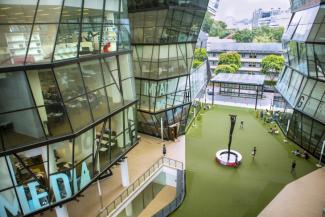
Singapore, 29 March 2017 (Wednesday) – The Institute of Service Excellence (ISE) at the Singapore Management University (SMU) (卓越服务研究院) today released the 2016 full-year results for the Customer Satisfaction Index of Singapore (CSISG), alongside the announcement of results for the Finance & Insurance and Healthcare sectors for the 4th quarter (Q4) of 2016.
The 2016 national score stands at 71.8 points (on a 0 to 100 scale). The uptick is led by improvements in Finance & Insurance and Healthcare sectors. Of the eleven sectors measured in 2016, all but the Logistics and Private Education sectors registered statistically significant year-on-year increases in scores.
“As the CSISG is a GDP-weighted Index, the year to year performance of the Finance & Insurance sector contributed substantially to the eventual national score,” noted Ms Neeta Lachmandas (妮塔.拉切曼达斯), ISE Executive Director (执行总监).
Within the Finance & Insurance sector, Banks scored 72.9 points (+1.75 points/+2.5%), an improvement from 2015. The improvement is underpinned by higher scores registered for perceived quality and perceived value. Customer satisfaction with the Motor and Other Personal Insurance, Life Insurance, as well as Health and Medical Insurance sub-sectors remain statistically unchanged from the year before.
“When we investigated into the attributes that drive quality and loyalty for Finance & Insurance, it becomes clear that the sector is highly relationship based. We found that qualities such as responsiveness, empathy, and assurance were key differentiators which these companies should focus on,” observed Ms Lachmandas.
Credit Cards as a sub-sector was introduced for the first time into the CSISG in 2016. The sub-sector scored 70.7 points, with Citibank, American Express and DBS/POSB leading the pack in rankings. Top attributes impacting satisfaction ratings for Credit Cards include ‘Merchant tie-ups that meet my needs’, ‘Ease of reward redemption’ and ‘Flexibility of policies such as waiver of charges’.
“Out of the touch points that credit card customers interacted with, contact centre was identified as the channel that customers engaged with the most but were least satisfied with. When we looked at some of the reasons customers gave for their dissatisfaction with contact centres, we noticed that service related issues such as response time, staff attitude and handling of fee waivers were mentioned.” said Mr Chen Yongchang (陈勇畅), ISE Head of Research and Consulting.
The Healthcare sector scored 71.0 points (+1.40 points/+2.0%), an improvement from the year before. The increase in score is primarily led by improvements seen in the Private Hospitals (73.2 points, +1.21 points/+1.7%) and Restructured Hospitals (70.0 points, +1.39 points/+2.0%) sub-sectors. The Polyclinics (70.3 points) sub-sector did not see any statistically significant movement in its customer satisfaction score from 2015. While perceived value went up for the Private Hospitals sub-sector, the Restructured Hospitals sub-sector saw improvements in perceived quality and perceived value.
“Looking at the customer journey undertaken at private and restructured hospitals, we see parallels in waiting time being singled out as the attribute with the poorest rating. Yet when we analysed the data further, we found that waiting experience was the attribute that had the most significant impact on customers’ perception of quality. This suggests that while shorter waiting times are welcomed at healthcare institutions, it was the waiting experience that was most important in determining how customers rate their satisfaction with healthcare providers,” added Mr Chen Yongchang.
The CSISG 2016 Q4 study was conducted between October 2016 and January 2017. A total of 9,402 surveys were completed. Prior to this, the Info-Communications and Retail sectors were measured in Q1. This was followed by the Air Transport, Land Transport, Logistics, Public Education, and Private Education sectors in Q2. The Food & Beverage and Tourism sectors were measured in Q3. In total, the CSISG 2016 study recorded 40,809 unique responses covering 1,245 entities representing the aforementioned sectors.
Please refer to Annex A for a background on the CSISG and Annex B for the detailed scores.
For media queries, please contact:
Ms Serene Ashley Chen
Assistant Director, Partnerships and Programme Development
Institute of Service Excellence (ISES) at Singapore Management University
DID: (65) 6808 5103
Mobile: (65) 9151 9030
Email: serenechen [at] smu.edu.sg (serenechen[at]smu[dot]edu[dot]sg)
Mr Teo Chang Ching
Senior Assistant Director, Corporate Communications
Office of Corporate Communications and Marketing
DID: (65) 6828 0451
Mobile: (65) 9431 8353
Email: ccteo [at] smu.edu.sg